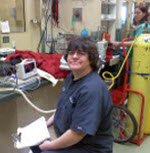VETERINARY NURSING: SMALL ANIMAL CARDIOVASCULAR ECC
| RACE Approved Interactive For Technicians/Nurses |
Course meets the requirements for 12 RACE hours of continuing education credit for veterinary technicians in jurisdictions which recognize AAVSB's RACE approval. However, participants should be aware that some boards have limitations on the number of hours accepted in certain categories and/or restrictions on certain methods of delivery.
RACE Subject Category: Medical; Delivery Method: Interactive Distance; Program Number 750023.

This course requires employment at a practice to complete one or more assignments.
|
| Course Focus - Learning Objectives - Completion Requirements |
Veterinary Nursing: Small Animal Cardiovascular ECC explores both intracardiac and extracardiac emergencies.
Upon completion of the course, the student will be able to:
- differentiate between intracardiac and cardiac diseases
- explain how to evaluate and interpret an electrocardiogram
- identify pericardiaI effusion and prepare the patient for a pericardiocentesis
- discuss the components of administering CPR
- explain how to care for a post-op open chest surgery
- outline normal hemostasis and discuss the tools available to evaluate hemostasis
- give examples of the uses of medications
- identify different coagulopathies and the clinical signs associated with each
- compare and contrast the causes of heart failure
Completion requirements:
Instructor Graded Interactive Critical Thinking and Case Study Assignments: Designed to help the participant apply the newly learned skills and knowledge via implementation focused and patient based scenarios
Comprehensive Module Quizzes: Must be submitted with a score of 80% or better, multiple attempts
Course Survey
A certificate of completion is provided.
|
| How Does the Enrollment Process Work? |
|
This course is designed to be as schedule friendly as possible as we understand it can be hard to fit interactive CE into an already busy life. Open enrollment allows students to enroll in this course at any time.
Once the course payment transaction has been submitted, we will receive a notification of enrollment. In addition, the student will be sent a couple of "heads up" emails. The payment receipt will be sent to the email address
designated
in the payment page of the shopping cart, by the person who paid.
There is a post-payment manual process we must complete in order to add the new student to the course.
Completing enrollments as quickly as
possible is a priority but it can take a full 24 hours, especially on weekends and holidays. Once fully enrolled. the student will be sent a course welcome email containing important information, including how to access and log into the course.
|
| Personal Completion Deadline |
|
This is an asynchronous course. Students are not expected to be logged into the course at any specific times as there are no real time lectures or requirements.
Students have 12 weeks from the date of payment to meet all completion requirements. The course welcome email will specify the student's personal completion deadline. If the student has not met the completion requirements by the deadline, they will be processed out of the course and graded as incomplete.
But What If Something Comes Up?
There are times when unforeseen situations interfere with a student's ability to complete by the deadline. In that case, an email to VetMedTeam, as soon as such a situation arises, will allow us to offer the best possible options.
|
| Technology Requirements |
|
Reading content within the course is provided via PDF therefore the ability to download files and open PDFs is required.
It is recommended that participants utilize a program such as MS Word to create, and save, their assignment submission to their computer. Then the information can be pasted into the assignment submission area.
|
| Participant Feedback |
|
When asked what aspects of the course liked best some responses were:
...Case studies helped bring a full picture to what I was reading through the chapters.
...I liked the critical thinking and research I had to do in order to complete the assignments. It really made me work and learn. Also, I liked talking about cases I've seen at work and going more in depth in my understanding of them.
...Helpful for my VTS ECC prep.
...motivated me to do further reading and investigation of physiology I did not fully understand
...The case studies were extremely beneficial so you could began to use the information in practice
|
| Course Instructor |
 Brandy Tabor, BS, CVT, VTS (ECC) Brandy Tabor, BS, CVT, VTS (ECC)
A native of Colorado, Brandy graduated from Colorado State University in the spring of 2003 with a BS in Equine Sciences. While attending CSU, she worked as a nurse's assistant in the Critical Care Unit at the Colorado State University Veterinary Teaching Hospital. Here, she learned just how far you can go with a career as a veterinary technician. She enrolled in Front Range Community College in Loveland, CO, graduating in 2005. Brandy then moved to Parker, CO where she currently works as a senior emergency and critical care technician. She had the honor of becoming a member of the Academy of Veterinary Emergency & Critical Care Technicians in 2008.
Brandy has a passion for writing and has written several papers for Today's Veterinary Practice, Veterinary Nursing Journal, Today's Veterinary Technician, and Veterinary Technician. She is also a contributor in the 5th edition of Review Questions and Answers for Veterinary Technicians. In addition she is the current chair of the AVECCT Credentials Committee.
Brandy currently lives with two birds, two cats, and two dogs.
|
| Pricing |
Price: $169.00 USD
Practices may enroll individual team members. To learn how to assign a specific team member to a course, please visit the Assigning Students page.
Please use this link to view the Withdrawal Policy for this course.
|